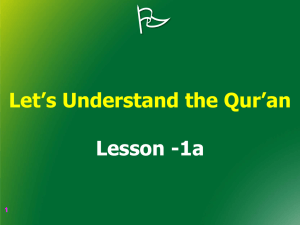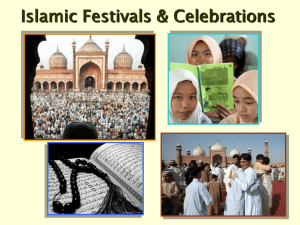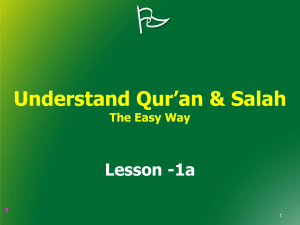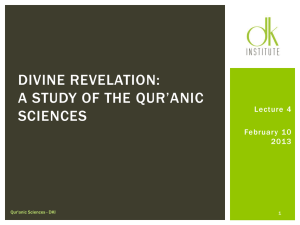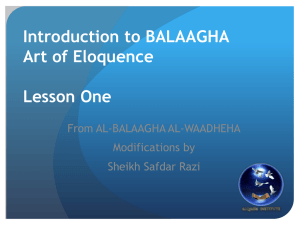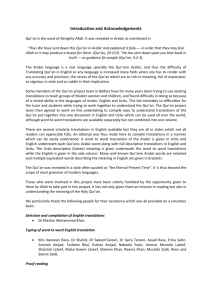Wisdom of Gradual Revelation of Holy Quran
advertisement
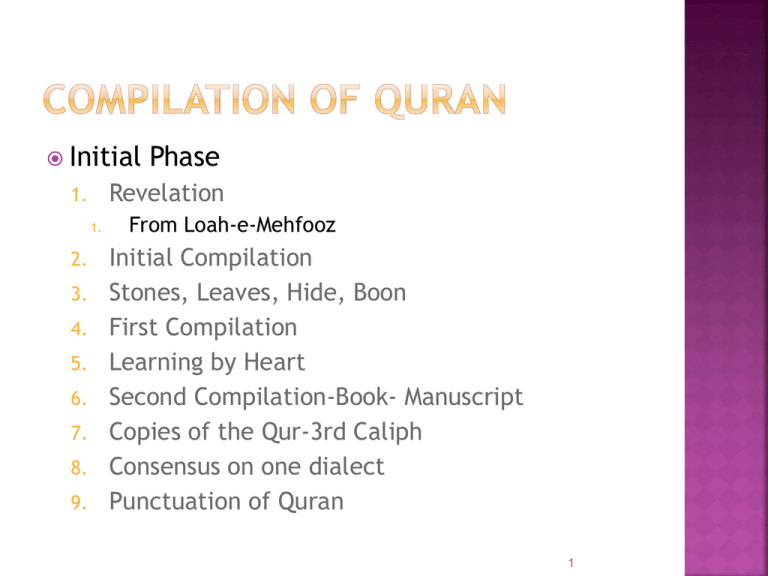
Initial Revelation 1. 1. 2. 3. 4. 5. 6. 7. 8. 9. Phase From Loah-e-Mehfooz Initial Compilation Stones, Leaves, Hide, Boon First Compilation Learning by Heart Second Compilation-Book- Manuscript Copies of the Qur-3rd Caliph Consensus on one dialect Punctuation of Quran 1 Surat Al-Ĥijr - سورة الحجر Lo! We, even We, reveal the Reminder, and lo! We verily are its Guardian. بےشک یہ (کتاب) نصیحت ہمیں نے اُتاری ہے اور ہم ہی اس کے نگہبان ہیں 2 Second Translations and Interpretations Translated in more than 100 Languages Third Phase Phase E Sources 3 Surat Al Alaq was first surah but placed as 96. Surat Al Mudassar was second surah but placed as 74. Surat Al Muzammil was third surah But placed as 73. Surat Al Qalam was fourth surah but placed as 68. Surat Al Akhlas was fifth surah but placed as 1. (1/96) (2/74) (3/73) (4/68) (5/1) 4 The verses however, were written on separate pieces, scrapes of leather, thin flat stones, leaflets, palm branches, shoulder blades, etc After the demise of the prophet, Abu Bakr (r.a.), ordered that the Qur’an be copied from the various different materials on to a common material and place, which was in the shape of sheets These were tied with strings so that nothing of the compilation was lost 5 Hazrat Usman (R.A.) borrowed the original manuscript of the Qur’an, which was authorized by the beloved Prophet (pbuh), from Hafsha (may Allah be pleased with her Hazrat Usman (R.A) ordered four Companions who were among the scribes who wrote the Qur’an when the Prophet dictated it, led by Zaid bin Sabit (R.A) to rewrite the script in several perfect copies. These were sent by Usman (R.A.) to the main centres of Muslims. Two such copies of the copied text of the original Qur’an authenticated by the Prophet are present to this day, one at the museum in Tashkent in erstwhile Soviet Union and the other at the Topkapi Museum in Istanbul, Turkey 6 The original manuscript of the Qur’an does not have the signs indicating the vowels in Arabic script These vowels are known as tashkil, zabar, zair, paish in Urdu and as fatah, damma and qasra in Arabic The Arabs did not require the vowel signs and diacritical marks for correct pronunciation of the Qur’an since it was their mother tongue For Muslims of non-Arab origin, however, it was difficult to recite the Qur’an correctly without the vowels These marks were introduced into the Quranic script during the time of the fifth ‘Umayyad’ Caliph, Malikar-Marwan (66-86 Hijri/685-705 C.E.) and during the governorship of Al-Hajaj in Iraq 7 Prophet Muhammad (PBUH) himself supervised and authenticated the written texts of the Qur’an Order and sequence of Qur’an divinely inspired Qur’an copied on one common material Usman (RA) made copies of the Qur’an from the original manuscript Diacritical marks were added for non-Arabs Allah Himself has promised to guard the Qur’an Allah has promised in the Qur’an : "We have, without doubt, sent down the Message; and We will assuredly Guard it (from corruption)." [Al- Hijr 15:9] 8 9 1.To strengthen the heart of Prophet Muhammad -may blessings and peace be upon him-. Allah decreed: “And those who disbelieve say, “Why was the Qur’an not revealed to him all at once?” Thus [it is] that We may strengthen thereby your heart. And We have spaced it distinctly (recited it with distinct recitation).” (Al Furqaan/The Criterian: 32) 10 11 2. Because by the gradual revelation, which was appropriating the event, condition, situation occurred at that time to be strongly recorded in mind and heart and leave a deeper impression for one who received it (Muhammad) and for one to who it was preached 12 The coming of the angel to him will also be more frequently, thus psychologically renew his spirits in carrying out the teaching he was obliged to. He (Muhammad -may blessings and peace be upon him-) must be very happy by the visits, which was hard to expressed. And because of this, the best moment in the month of Ramadan, is due to his reunion with the angel Gabriel 13 2. who refused to believe in Qur’an, since they thought that it was curious for a Holy Book to be revealed gradually Hence, Allah challenged them to create just a single soorah that comparable to it In fact, the weren’t able to create even a single soorah that comparable to Qur’an, moreover a whole book of it 14 3. To make it easier to be understood and memorized. the gradual revelation of the Qur’an, mankind was easier to memorize it, and to understand it’s meaning, particularly for illiterate people as the Arabs at that time And once the verses of Qur’an revealed, they were directly memorized, understood, and practiced by the companions in their daily life. That is why, Umar Ibn Khattab RA once said, “Learn the Qur’an five verses to five verses. Because (angel) Gabriel used to bring down the Qur’an to the Prophet -may blessings and peace be upon him-, five verses to five verses.” (Collected by Baihaqi) 15 4. To make the Muslims enthusiast in receiving the teaching of Qur’an, and to make them zealous in practicing it By gradual revelation, Muslims at that time were always expecting it, and missing the time of revelation of The verses Particularly at the time they most need of it, such as the verses told about the false accusations from the hypocrites to the mother of the believers, Aisha, and verses explained about li’an 16 5. To accompany to events happened among Muslims at that time, and to gradually establish the rulings for specific matters 17 The Qur’an started to be revealed gradually: from the most important matters, followed by the lower priorities in urgency. Since the most essential matter in Islam is faith, then the first thing prioritized to be explained and revealed through Qur’an were about the faith in Allah, His angels, His books, His messengers, the Hour, the resurrection, and the heaven and the hellfire. 18 After the Islamic beliefs grew and rooted strongly inside their hearts, that was the time Allah sent down the verses urged them to perform noble deeds, and prevented them from doing evil and wicked actions, to extinct the evildoings and damages to their roots Also the verses explained about the legal and illegal in foods, beverages, properties, honors, blood/murders, etc. 19 Examples As Allah decreed: “Say, “Come, I will explain what your Lord has prohibited to you. [He commands] that you not associate anything with him, and to parents, good treatment, and do not kill your children out of poverty; We will provide for you and them.” (Al An’am,/The Cattle: 152) After that, the verses detailed about the rulings came in Medina, such as verse about the prohibition of usury and the legal state of trading. About adultery, was also prohibited in Mecca, in the verse of: Soorah Al An’am (The Cattle) is termed soorah makkiya, because it was revealed while the prophet was still in Mecca. The contents explained much upon faith, beliefs, tawheed (oneness of Allah), the danger of shirk, and the legal or illegal ones. “And do not approach unlawful relations. Indeed, it is ever an immorality and is evil as away.” (Al Isra’/The night journey:32) But the verses explained the details of punishment for the adulteress came in Medina afterward. 20 Upon the prohibition of khamr (alcoholic drugs). The first verse to come was the verse of: “And from fruits of the palm trees and the grapevines you take an intoxicant and good provisions…” (An Nahl/The Bee: 67) After that, came the verse of: “They ask you about wine and gambling. Say, “In them is great sin and [yet, some] benefit for people. But their sin is greater than their benefit.” (Al Baqara/The Cow: 219) 21 In that verse, it was stated that the wine has some temporary benefits for mankind, but it’s danger is larger in effects toward their body; it could deteriorate their minds, it was a waste for their wealth, and could lead to various problems of crime and evil among society. After that verse, came the strict verse prohibited the drunk from performing prayers. “O you who have believed, do not approach prayer while you are intoxicated until you know what you are saying.” (An Nisaa’/The Women: 43) 22 After they acknowledged and recognized that drunk while praying was prohibited, then the stricter verse was revealed: “O you who have believed, indeed intoxicants, gambling, [sacrificing on] stone alters [to other than Allah] and divining arrows are but defilement from the work of satan, so avoid it that you may be successful.” (Al Maida/The Table Spread: 90) 23 Thus, the Qur’an was revealed properly according to the events surrounded Muslims life, along with their long and historical strives to establish the religion of Allah on His earth. And the verses were endlessly supporting and motivating them through their struggles 24
